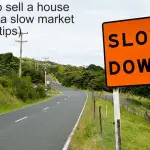
Are you longing for that next call from your estate agent for a viewing by a prospective buyer for your house? Have you been waiting for that call from your estate agent with an offer from someone who’s viewed your house? Is your house not selling, yet other houses on the market are selling right under your nose? Do you feel trapped?
If this is your situation, this can be extremely frustrating. Not to mention stressful. But don’t get stressed, as there are solutions, which I list in this article.
What happens if you can’t sell your house?
Quick solutions to the problem where you can’t sell your house
- Make cheap but effective improvements to your home.
- Change your estate agent.
- Reduce the price as all houses sell at the right price.
- Ask for help from your employer if you’re selling to relocate for work.
- Sell quickly to a ‘cash’ investor.
- Sell your house at auction.
- Consider a lease option sale.
Other solutions to the problem where you can’t sell your house
- Walk away from your house and let the mortgage lender repossess your home.
- Sell your house on a short sale.
- Take your house off the market to re-list it another time.
- Become a landlord and rent your house to tenants.
Let’s take a look at each of the above solutions in turn.
Are you stuck with a house that won’t sell and need to know what to do?
1. Make cheap but effective repairs and improvements or upgrades to your house and garden
Many times the reason why a house isn’t selling is because it needs some TLC or tender loving care. This becomes a challenge if you don’t have the money for the improvements. But sometimes you can get away with some cheap, but effective repairs or improvements.
But often houses that are in need of major repairs will not sell to conventional buyers. Instead these types of house usually sell to builders or investors.
The cheapest and simplest improvement you can do is to make sure the painting and decorating is up together on both the inside and outside of your house.
Speak with your estate agent and ask them what improvements they suggest. Ask for honest feedback from people who have viewed your property. Take this feedback constructively and make any suggested improvements you can afford to make.
If your house is in need of updating and improvement, but you cannot afford these repairs, please contact us, as we may be interested in buying your house. However, the buying price in this case would need to reflect the state of repair of your house. But a better option might be to consider a property lease option (see below).
2. Change your estate agent
The reason why your house may not be selling, apart from it being priced too high, is you’ve chosen the wrong estate agent. It’s important to choose the right estate agent to sell your house.
3. Reduce the price as all houses will sell at the right price
If you accept that any house will sell at the right price, then it may be the reason your house won’t sell is because it’s over-priced. Did you listen to your estate agent about the value of your house. Or did you ask them to list it for more?
Did you go with the estate agent with the highest valuation. Bear in mind that estate agents play games on this point. They win your business by playing to your ego. Most people love to think their house is worth more. Or sometimes, this is also about wishful thinking.
But always remember this, the sale of any house is a combination of the following two people:
- A willing buyer, AND;
- A willing seller.
It is as simple that. The true value of a house is when the buyer and the seller meet on price. If your house is over priced, it will either not sell at all. Or expected people to offer below asking price. If it turns out your house is listed over what its worth, you should reduce the price right away.
However, if your house is priced right, it will sell in the right housing market. Remember there are good times and bad times to sell your house. There are certain months that are the best time to sell.
If your house is under-valued, you will usually sell it very quickly. Which might be the right strategy to go with if you are desperate to sell very quickly.
4. Ask for help from your employer if you’re selling to relocate for work
If the reason for selling your house is down to relocating for work, you could speak with your employer and see if they will help. There may be something they can do to help until you are able to sell your house.
5. Sell quickly to a ‘cash‘ investor
If your back is against the wall and you really do need to sell very quickly, then you may wish to consider selling for cash to an investor. However, if this is your chosen route,always remember that investors are in it to make some money.
When you sell quickly to an investor, the reason they have to offer at well below market value is they need to make a return on the deal, as this is their livelihood. Once you appreciate this, you will be less offended when a low-ball offer is made on your house.
When you sell to a conventional buyer they usually have a place to sell and can sometimes be in a long chain. This adds time and stress to the transaction. The chain can fall through, which means your sale falls through. You will then need to relist it and start the sales process all over again.
Whilst investors will sometimes need to raise finance to purchase your property, which is similar to a conventional purchaser, they can usually act much faster. The reason for this is investors are used to dealing with buying and selling houses. They will normally have a mortgage broker on hand ready to work out the finance straight away.
Investors know they need to move fast, they don’t have to sell in order to buy and will be able to complete on the purchase very quickly. If you are happy to consider a quick ‘cash’ sale of your property and if you are willing to accept an offer at under market value, please contact us for how this can be achieved.
6. Sell your house at auction
Although selling at auction comes with its disadvantages, there are many advantages too. When the hammer comes down at auction, the bidder is committed to buy your house at the price bid. The winning bidder must pay a 10% deposit immediately and the balance is usually due within 28 days from the auction date.
However, your house is less likely to sell at auction if the reserve price you put on your house is too high. The reserve price is the price at which the auctioneer cannot sell your house if the bidding process doesn’t reach this price.
Selling at auction is a quick means of selling your house and can give level of certainty about the selling process.
7. Consider a lease option sale
Selling your house by way of a lease option is better explained by way of an article in itself. An article on property lease options can be found here ‘Are lease options a good idea?’ Having said that it’s worth explaining in summary how this solution works.
A lease option is achieved whereby an investor agrees to buy your house at an agreed price at some time in the future. This could even be at a price that’s in excess of what your house is on the market for today. Of course it could be less or it could be the same price at which it’s listed for sale.
The second element to a lease option is what’s called an option fee. Where the option fee is an amount that is agreed between the buyer (i.e. the investor) and the seller.
This could be for example, the difference between what your house is worth and what you owe. It could be as little as £1, which could be the case if your house is in negative equity or where there’s zero equity in it. The important thing to stress about the ‘option fee’ is that it’s totally up for negotiation between you and the investor.
The final element to a lease option is the ‘lease fee’. The lease fee is the amount the ‘buyer’ agrees to pay you each month until such time as the buyer completes on the deal. The ‘lease fee’ is generally equal to the mortgage payments.
Please click ‘lease option sales‘ for more details. Or if this is something you want to speak to us about, then please contact us. We are often working with sellers who can’t sell their homes using a lease option as the solution. This works extremely well.
8. Sell your house on a short sale
If the reason why you are selling you house is because you are behind on your mortgage payments, a short sale is one solution. It’s not something I would suggest you do. Plus short sales are not so common in the UK.
A short sale is when a home owner sells their house for less than the amount owed on the mortgage. But in order to do so, the home owner needs to agree the short sale with their mortgage lender. Not all lenders will agree to a short sale and by doing so will leave your credit report badly affected.
Many of the other solutions provide a much better solution in the circumstances.
9. Walk away from your house and let the mortgage lender repossess your home
As with the above solution of agreeing a short sale with your lender, allowing your home to be repossessed is an outcome you should try to avoid at all costs. Whilst I have listed repossession as a solution, please don’t act on this option!
Once you are in arrears on your mortgage, the repossession process begins. The best advice is for you to communicate with your mortgage lender if this is the case. Don’t ignore them, as you may be able to agree a solution.
But even better advice is for you to seek help from a professional. Or speak to someone at your local Citizens Advice Centre. Or contact Shelter or Step Change.
When you’ve been repossessed, you may not get any money back from the repossession process. In the future you will find it much more difficult to get another mortgage.
If you are going through the repossession process, we would also like to help you too. There are a number of solutions we can help you with this. So please contact us as soon as possible in order to avoid your home from being repossessed.
10. Take your house off the market to re-list it another time
If you are not in a desperate hurry to sell. For example you are only selling to down-size. Or perhaps moving to be a with your new partner, which in reality can wait. Then if you can’t sell your house, you could take it off the market for now and re-list it another time.
11. Become a landlord and rent your house to tenants
The final solution if you can’t sell your house is to let it out to tenants and become a landlord. Becoming a landlord is a soution, but it’s not for everyone.
Plus the government have made it much more difficult for those would-be accidental landlords. The UK government have taken away tax relief on interest payments against rental income for those who are 40% or higher tax payers., plus other things.
Please read this article ‘what are the tax implications of buying a house before selling‘.
Not only have the UK government ruined this solution for many homeowners, but they have changed some of the rules around tenant rights and what charges letting agents can charge to tenants, which end up falling back onto you as the landlord.
So think carefully before you become a landlord.
Reasons why you may wish to sell your house now
There could be many reasons why you want to sell your house. Plus there can be many reasons why you can’t sell your house too. But if you can’t sell your house and you need to, this is when things become stressful.
The biggest problem for anyone who wants to sell their house, but they’re in negative equity, is when it’s tricky.
If you are in negative equity, which means you owe more on your mortgage than what your home is worth, then unless you are able to cover the difference (i.e. the negative equity amount), you could be stuck.
If you fall into one of these categories or reasons why you need to sell your house, then don’t despair, as solutions are available for you. But the solution to your problem is rather dependent on your reason why you need to sell. So let’s take a look at these first.
Reasons for needing to sell include:
- No longer able to afford your mortgage payments.
- Wanting to down-size.
- Needing more space or bedrooms with an increasing family.
- Relocating for work purposes.
- You are emigrating abroad.
- Moving to be with a new partner.
- Getting divorced or separating from a partner.
If you are genuinely stuck and in need of help, please don’t hesitate to contact us. We may be able to solve your problem.
I hope you’ve got something from reading this article on what happens if you can’t sell your house
If you’ve got something from this article on what happens if you can’t sell your house please share it on your favourite social media site.
Also, if you have any questions, please feel free to comment below too. Alternatively, if you need more help, please feel free to contact us on our contact us page here. Or join the discussion and ask your question in the property forum.




